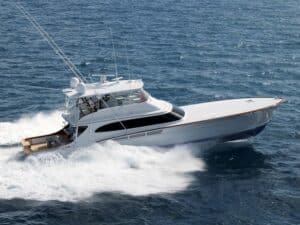
I often get questions regarding the ability of foreign citizens to document their boat with the U.S. Coast Guard or title and register their boat under the laws of a state within the United States. Generally speaking, the response is “maybe,” but the exact answer depends on the specific scenario. That being said, the rules vary between Coast Guard documentation and state registration, so it’s important to know the difference.
Only U.S. Citizens Can Document a Vessel
Coast Guard documentation is a national form of registration. It affords conclusive evidence of the boat’s nationality for international purposes, provides for unhindered commerce between states, and admits vessels to certain restricted trades, such as coastwise trade and fisheries. A vessel must be at least 5 net tons to be documented and wholly owned by a citizen(s) of the United States. Hence, foreign individuals cannot document a vessel with the U.S. Coast Guard. Corporate ownership is where things get a bit trickier because there are varying requirements depending on the type of endorsements — recreational, coastwise, etc. — required for a vessel’s operation. However, all entities, regardless of endorsements sought, must be U.S. domiciled and managed by U.S. citizens.
Corporate Ownership
A corporation must be incorporated under the laws of the United States or an individual state, its CEO (or similar title) and the chairman of the board of directors must be U.S. citizens, and no more than a minority of the number of directors necessary to constitute a quorum can be noncitizens. A corporation that meets the above requirements and does not seek the right to engage in coastwise trade (e.g., a sport-fishing charter) can be 100 percent owned by noncitizens.
In a general partnership, each general partner must be a U.S. citizen in order for the entity to be eligible to own a documented vessel. Additionally, U.S. citizens must also own at least 50 percent of the equity interest in the partnership. Limited-liability companies are a bit unusual because there are no regulations for such entities with respect to documentation, yet they are the most common entity used for vessel ownership in the United States today. Accordingly, their treatment depends on whether the LLC is a manager-managed or member-managed entity, with different requirements for each. In a manager-managed LLC, U.S. citizens must manage or control the LLC and typically own at least 50 percent equity interest for a recreational endorsement and 75 percent for a coastwise or fishery endorsement. On the other hand, a member-managed LLC requires all members to be U.S. citizens in order to be eligible.
The requirements become stricter when seeking something other than a recreational endorsement, such as a coastwise or fishery endorsement. More specifically, at least 75 percent of the stock or equity interest in the company must be owned by U.S. citizens. Though this seems like a basic requirement, it becomes quite difficult to apply when dealing with large corporations. The primary take-away: Individual foreign citizens cannot document a boat with the Coast Guard, and corporate ownership involves a complex set of rules and regulations, which might not be practical in all scenarios.
Permits to Proceed
One misconception is that noncitizens can get around the strict rules of Coast Guard documentation by simply state titling and registering their boats. Unfortunately, it isn’t that simple. To avoid confusion, a noncitizen’s vessel can be titled/registered in most states, but the vessel will not have freedom of movement. United States Customs treats vessels based on their nationality. A state registered/titled vessel does not have a “flag” or nationality, so if a vessel is not foreign flagged or documented with the Coast Guard (U.S. flagged), then it assumes the nationality of its beneficial owner. Hence, a noncitizen’s boat, if titled and registered in Florida, is considered to be a foreign vessel, and is thus treated as such. In this case, a vessel must obtain something called a “Permit to Proceed” from U.S. Customs in order to move from port to port. Failure to follow these regulations can result in fines or even seizure of the vessel itself. As such, foreign citizens typically choose to register their boats in other jurisdictions to avoid customs formalities by obtaining a U.S. cruising license.
The details are fairly basic, but this provides some insight into the complexities of vessel ownership by foreign citizens in the U.S. Every noncitizen should become familiar with the regulations prior to taking ownership of a vessel, and more often than not, the best option for a foreign citizen is to register their vessel outside the United States.







